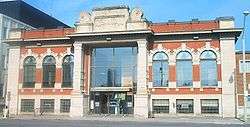Thunder Bay Public Library
 | |
| Established | 1970 |
|---|---|
| Location | Thunder Bay, Ontario |
| Branches | 4 |
| Collection | |
| Items collected | business directories, phone books, maps, government publications, books, periodicals, genealogy, local history, |
| Access and use | |
| Circulation | 941,526 (2006)[1] |
| Population served | 110,000 |
| Other information | |
| Budget | $4,818,704 (2005)[2] |
| Director | John Pateman |
| Staff |
55 full time 67 part time |
| Website | http://www.tbpl.ca/ |

The Thunder Bay Public Library serves the citizens of Thunder Bay, Ontario, Canada and surrounding areas.
Services
- Information and reference services
- Access to full text databases
- Community information
- Internet access
- Reader's advisory services
- Programs for children, youth and adults
- Delivery to homebound individuals
- Interlibrary loan
- Free downloadable audiobooks
History
The library got its start when the Port Arthur Library opened a Mechanics' Institute in the schoolhouse in 1876. Membership fees were $20.00 for life or $2.00 per year. The present building at 285 Red River Road opened on June 1, 1951 as the Port Arthur Public Library.
Library services for Fort William began in 1885 when Canadian Pacific Railway (CPR) employees opened a bath, along with a smoking and literary room, with a library attached in the Round House at West Fort William. Fees were $1.25 per year for CPR employees; non-employees were required to pay $1.25 for use of the tub.
With the assistance of a $50,000 grant from the Carnegie Foundation, the Fort William Library moved to its new location at 216 South Brodie Street in 1912, with Mary J. L. Black as the librarian (who served from 1909–1937). The Fort William Library saw its first major change when an addition was added to the south side of the building in 1955, increasing the floor area from 14,000 square feet (1,300 m2) to 23,150 square feet (2,151 m2). In 1966 the front entrance was rebuilt.
When the Westfort branch library at 151 West Brock Street opened in 1938, it was named for Black, who had also been the first woman president of the Ontario Library Association.
The present Thunder Bay Public Library officially came into being in 1970, after the amalgamation of the Port Arthur and Fort William branches. The inaugural meeting of the Library Board was held in January, 1970; the Chairman opened the meeting by outlining the problems facing the Board in integrating the operations of the two branches. It was also deemed essential that a logo should be created for use on stationary, posters, signs and cards. A contest was held requesting designs from the public, and in March, 1971 the first prize design was adopted, showing a Native Canadian reading a book. The logo was revised in March 1992 by Barry Smith to reflect a more modern outlook.
In 1976 a bookmobile with a small collection of adult and children's materials began to visit several sites, including some city shopping malls, Current River, outlying elementary schools and some senior citizens' residences. Although the service was popular with some users, the prohibitive cost of the vehicle and limited use by patrons led to the elimination of the bookmobile in 1986.
In 1980 the Brodie Street Library received an extensive renovation, and in 1981, its collection was rearranged with the adult fiction materials and moved to the new branch in the Victoriaville Mall. The branch, which officially opened on June 25, 1981, housed fiction, a small collection of children's materials, and some magazines as well as the two local papers.
On February 27, 1982, the city's Local Architectural Conservation Advisory Committee (LACAC.) designated the Brodie Street Library as a historically significant building.
Over the next few years, work focused on the automation project, which was installed in 1986. The GEAC online circulation system was launched on June 4, 1986, and in 1994, the library upgraded its automation system to the GEAC Advance system.
Meanwhile, circulation of materials at Victoriaville did not reach the levels that the library had expected, and the branch closed on May 14, 1995. At this time the fiction collection was returned to Brodie, which was again renovated in order to make room for these materials.
In December 1995, the County Park Branch Library, located in County Fair Mall, opened its doors after much public interest from local area residents. The population shift to this area of the city and the outlying region meant the library had to rethink service points and access for the citizens; subsequently, this location has remained very busy since its inception.
Customer service is an ongoing priority for Thunder Bay Public Library with training for all staff members and development of standards based on customer feedback. [3]
See also
References
- ↑ Thunder Bay Public Library - Monthly Use Statistics
- ↑ Thunder Bay Public Library - Annual Report 2005
- ↑ Text from About TBPL/History page on www.tbpl.ca Used with permission.
External links
- Thunder Bay Public Library
- Ontario Public Libraries
- Book a Library Computer Online
- Online fine payment
- Social Web Sites
- FaceBook Page